In Mezhova, Dnipropetrovsk Region, 17 kilometers from the front line in the Donetsk Oblast, journalists from the Mezhivskyi Merydian newspaper are working under daily FPV drone attacks and without stable access to electricity, mobile communications, and the internet. The security situation in the community is rapidly deteriorating, and editor Yevhen Khrypun and his team are appealing to the NUJU and international partners for urgent relocation to the city of Dnipro to save lives and preserve the publication.
“I would like to take out the archive, relocate my colleagues, and somehow I will be here myself, as long as possible,” these were the thoughts shared by Mezhivskyi Merydian editor Yevhen Khrypun during an online meeting with colleagues from the NUJU central office.
The front feels closer every day. Drones are circling in their hundreds over the community, burning down the streets of childhood. The enemy does not neglect using guided bombs.
“Yesterday, an FPV drone hit the roof of the house where my dad lived. Thank God, I took him out a week ago,” the editor admits.
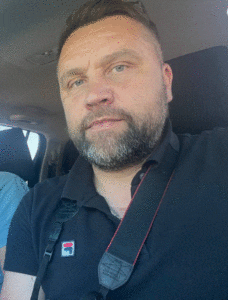
Of Yevhen‘s relatives, his wife remains with him. She is his contact person in case of loss of communication.
A thin Ukrtelecom wire in the newsroom is what keeps him connected to the outside world. His editor kept it for those of his readers whose calls had become familiar and familiar to him over the years of work – those whose voices you recognize. And in wartime, this means of communication became indispensable – a symbol that the newsroom is alive.
The Mezhivskyi Merydian newspaper is supported by four employees, including the editor. Layout designer Nataliya Vozniuk, whose son went missing a month ago, faithfully performed her duties until the end. “She honestly wrote the newspaper. I even wonder how she held on,” the editor says sadly. “But due to the increased shelling, she has now left for her relatives in the Kyiv Region.”
Like most editors of regional media, Yevhen has newspaper layout skills. However, he is burdened with a lot of administrative and organizational tasks, so help with the layout of issues would be a tangible relief, the editor says.
The newspaper continues to be printed in Chernivtsi. Currently, the newsroom does not issue subscriptions, because “people do not know where they will be tomorrow.” However, according to the editor, another 500-600 copies are distributed throughout the Mezhivskyi Merydian community. There is practically no advertising, and announcements about lost military tickets remain the most typical for Mezhivskyi Merydian.
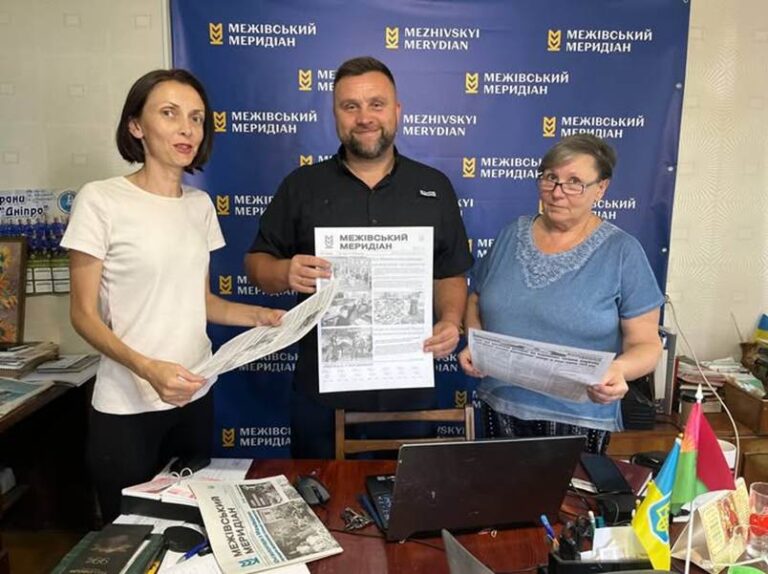
Young employee Snezhana Salivon, a journalist and assistant editor, lives in Novohryhorivka, 23 kilometers away from Mezhova. Given the difficult situation in the region, the contract with her was concluded only for August. The girl edits videos, fills social networks. For example, they are spreading the editorial video “Harvest on the Line of Fire. How Novopavlivka Farmers Harvest Bread 10 kilometers from the Front.” The story tells about a combine harvester driver who, wearing a bulletproof vest, completes the harvest, driving through part of the surviving field. Most of the field had been burned by the enemy. Combine harvesters with RW devices and anti-drone nets are the current realities of working in the field.
Currently, the team is virtually without institutional support. Part of the income comes from individual grant fees for materials. But, as Yevhen admits, this is not enough. He is looking for monetization options through social networks, continues to write, maintain a page, and wants to maintain the community’s presence in the information space.
The editor notes that thanks to social networks, the Facebook post reach was 4.6 million in the last 28 days alone. This figure is not about a marketing strategy. It is about the reality of a front-line community, where every photo or post from the newsroom is evidence of a struggle for survival.
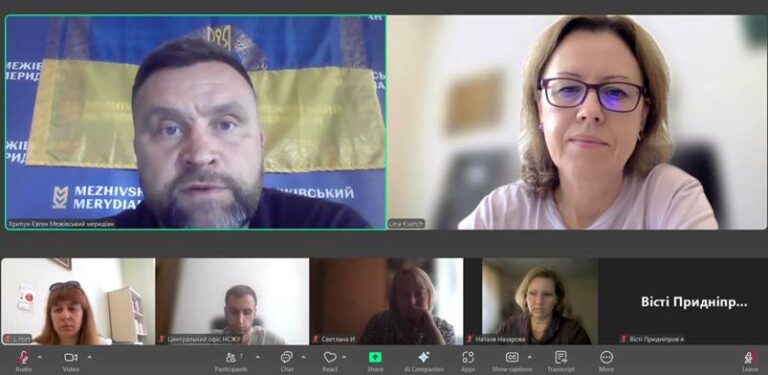
Lina Kushch, the First Secretary of the NUJU, strongly recommends that Yevhen Khrypun consider a temporary six-month departure to relocate the newsroom and continue work in a relatively safe community.
NUJU President Sergiy Tomilenko notes that among the priority steps initiated by the Union is an appeal to the State Committee for Television and Radio Broadcasting with a request to provide the newsroom with temporary premises in one of the publishing complexes in Dnipro. The Dnipropetrovsk regional organization of the NUJU is in constant contact with its colleagues.
“We are monitoring the security situation in our region,” says Nataliya Nazarova, the coordinator of the Dnipro Journalists’ Solidarity Center (JSC) of the NUJU, “and we are also in touch with Yevhen. But already on August 1, he had a conversation with Oleksii Kovalchuk, the board chairperson of the regional JSC, about relocating the newsroom, because the situation in the community is critical. Of course, we, for our part, got involved in full force – we are selecting premises for the newsroom, possible options for renting housing for employees, transport for transportation….”
The Union also guaranteed the Mezhivskyi Merydian team emergency financial assistance.
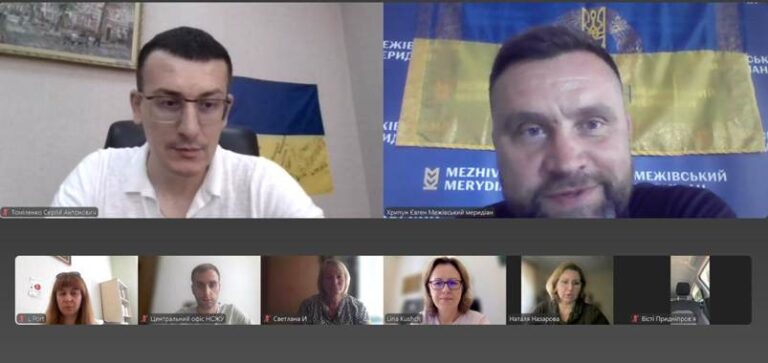
Sergiy Tomilenko emphasizes that it is important not only to evacuate, but also to continue recording russian war crimes, “because this helps to keep the attention of the international community, some organizations to the front-line press.”
The newspaper is still being published from the newsroom, which doesn’t even have a basement to wait out the shelling. Yevhen Khrypun doesn’t ask for much. To take out the archive, help the team settle in a new place, and return to the settlement of Mezhova for at least a day or two to see his people, collect stories, and print a new issue. Because even under air raid alert sirens and explosions, someone has to keep in touch. And he is kept in touch by a thin wire from the newsroom, a Facebook page with a million followers, and people who read in their native newspaper what they can’t tell anyone else.
Larysa Portianko
NUJU Information Service

 THE NATIONAL UNION OF
JOURNALISTS OF UKRAINE
THE NATIONAL UNION OF
JOURNALISTS OF UKRAINE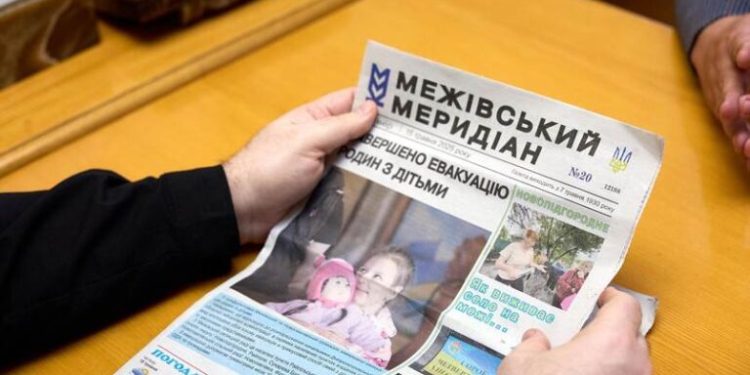
















Discussion about this post